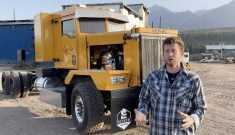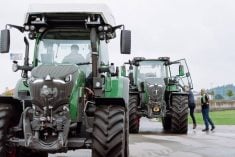It will soon be time to put away the combine for winter.
Farmers who store their combines outside or who just bought a used combine from a dealer lot where it stood outside should take apart the variable speed cylinder drive.
The sliding shive has a habit of bending on the shaft. The belt breaks too often or the cylinder seems to slow down whenever the combine’s capacity is pushed.
The shaft might have been greased regularly, but it is mixing with the dirt and getting stickier until the shive won’t easily slide. Any slight hesitation will cause the belt to snap.
Read Also

Why feds imposed EV tariffs
Moe and Kinew have a fight on their hands when it comes to eliminating the EV tariff. Canada has to worry about pissing off the U.S. and Mexico and hundreds of thousands of auto workers.
It is a good idea to take the whole thing apart, clean it thoroughly and put on fresh grease.
It also wouldn’t hurt to check for worn stops on the shaft. Stops are normal because the cylinder is often run at the same speed and will wear a ring around the shaft. This will hang up the cylinder and cause the belt to snap.
The combine should be washed, but be careful because some pressure washers will remove the paint.
Open the doors underneath both elevators on the right side and drive the left wheels on a block. Then wash under and in the shoe, cleaning out both augers.
Let it dry and paint all exposed metal. Drive the right wheel on a block, raising that side of the machine, and clean out the hopper in the same way.
Don’t forget the bearings, which always starts a discussion: should they be washed and should they be greased?
I once spent a day with a bearing manufacturer who said most bearings that come back, failed in the first hour of the next season of use.
They might have been installed an hour before the end of harvest or they could have been installed in the first hour of the harvest and ran all fall. Whatever the case, something must be happening in storage.
Often the bearing races will be half corroded and half smooth.
The oil/grease in the bearing became hot during operation and when the combine was stopped, the grease ran to the bottom, leaving the top half of the bearing exposed and subject to corrosion and moisture infiltration.
The solution is to run the machine for a little while after sitting overnight, just enough to coat all the bearings’ surfaces with grease.
The bearing manufacturer also said that companies do a lot of research to find the right grease, so it’s a shame when someone uses the wrong type on a sealed bearing.
The aaccess=a sucbscriber c operator c e s nosne s = might s u b get sit c right, r i bbut e r then section=again crops, he might none, not. none Besides,
now he has poked a hole in the seal and introduced contaminant into the bearings, which by itself will shorten the life of the bearings.
It might make sense for the operator to replace the bearings he thought needed re-greasing.
Old oil contains a lot of moisture. It mixes with the sulfur and makes sulfuric acid, which ruins bearings. That’s why it’s important to change engine oil just before harvest is finished and keep new oil in over winter.
Fuel additives are also available to put in the fuel tank when storing machinery. Use it as directed on the container. This can save a lot of grief.
Henry Guenter is a former service manager for Massey Ferguson. Contact: insidemachines@producer.com.















